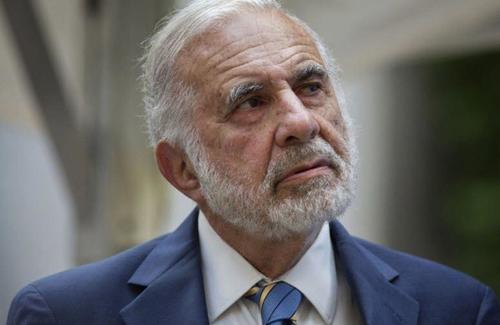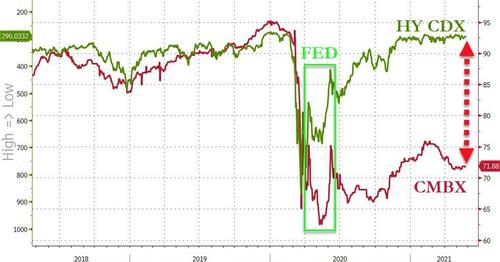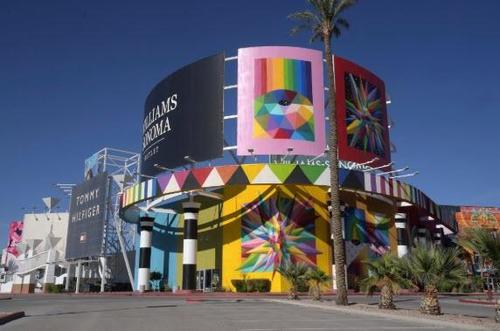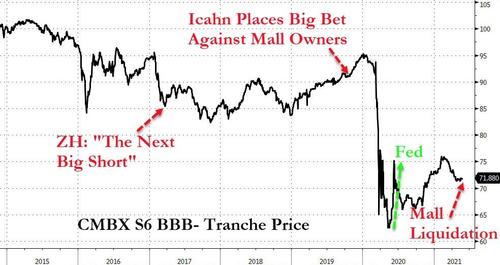“Eerily Analogous To 2008” – Carl Icahn’s “Big Short 2.0” Trade Starts Paying Off As Mall Loan Fails
In 2017, we were among the first to bring the market’s attention to what has subsequently been dubbed “Big Short 2.0” as we reported that “Mega-Bears Smell Blood As Mall REITs Tumble.”
“Wall Street speculators are zeroing in on the next U.S. credit crisis: the mall…. Its no secret many mall complexes have been struggling for years as Americans do more of their shopping online. But now, theyre catching the eye of hedge-fund types who think some may soon buckle under their debts, much the way many homeowners did nearly a decade ago.”
In late 2019, none other than iconic investor Carl Icahn jumped in to the the big short 2.0, shorting America’s malls by going long default risk via CMBX, or otherwise shorting the CMBS.
As a reminder, CMBX 6 – which tracks the value of 25 commercial-mortgage-backed securities, or CMBS – grabbed investor attention because it has significant exposure to loans made in 2012 to malls that lately have been running into difficulties.
A certain iconic investor seems to be aggressively entering the “Big Short 2.0” trade
— zerohedge (@zerohedge) July 29, 2019
Many (long-only bond managers) argued against Icahn’s bet against mall owners at the time…
The short sellers are peddling a “false narrative,” said Brian Phillips, director of commercial real estate credit research at AllianceBernstein.
“They are focused on momentum rather than credit fundamentals.”
But the corporate raider pressed on undeterred as The Wall Street Journal estimated that the billionaire investor stood to gain $400 million or more if mall owners run into challenges servicing their debt, according to people familiar with the matter.
And so, despite trillions in Fed liquidity to prop up every asset class in the world (especially credit), the CMBS market has failed to get over-excited…
And today could be the start of the reality wave reappearing as Bloomberg reports that a loan tied to a beleaguered mall outside of Las Vegas realized a loss of 120% after the shopping center sold for about the same price as a condo.
The loan, which had a current balance of $62.2 million, was completely written down after the Prizm Outlets were liquidated for just over $400,000, according to Bank of America Corp. The Prizm Outlets had been valued as high as $28.2 million less than a year ago, and $125 million in 2012 when the loans were bundled into a commercial mortgage-backed security.
When accounting for $11.5 million in fees and reimbursements owed to the master servicer for advances made, the total realized loss came out to $74 million.
The Prizm Outlet Mall in Primm, Nevada.
That’s the largest loss — both in terms of dollar amount and as a percent of the original loan balance — for a commercial mortgage backed conduit loan since the 2008 financial crisis, Bank of America analysts Alan Todd, Mao Dingand Graham Voss wrote in a May 21 report.
“May 2021 servicer data that was released indicates the asset resolved with a larger loss than expected,” commercial real estate data company Trepp said in a May 18 report.
This is the first payout to those who shorted the index…
The two lowest-ranking tranches of the CMBS deal’s capital structure were completely written off this month as a result of the liquidation, Bank of America said. The tranche above that, originally rated in the BB range, was partially written down.
83-year-old Icahn appears to have been vindicated as Bloomberg’s Cott Deveau sat down with the infamous investor this week, where he warned: “We believe these mortgages will have the same disastrous fate as mortgage-backed securities had in the 2008 debacle.”
You made a bet against malls heading into the pandemic by shorting an index designed to reflect the creditworthiness of certain commercial mortgage-backed securities. Do you still think that’s the right vehicle for that view?
My “big bet” against these malls still stands.
In fact, it is currently one of our largest positions.
On a risk-reward basis, I believe my short bet on these malls is about as good a bet you can make in today’s dangerous markets.
The bet is that the malls and other questionable real estate represented by the CMBX 6 will not be able to refinance and pay off their mortgages, which include a large number of mall mortgages due in 2022. We believe these mortgages will have the same disastrous fate as mortgage-backed securities had in the 2008 debacle.
We’ve effectively purchased billions of dollars of insurance on these mortgages by entering into credit-default swap contracts. The CDS contracts require us to pay a small fixed amount annually to counterparties who agree basically to insure that a certain level of these mortgages get paid at par. As it becomes more and more apparent that a number of these malls and other distressed properties will not be able to pay these mortgages, the value of this insurance increases in value.
Interestingly, large mutual funds such as AllianceBernstein and Putnam have taken the other side of my “bet” in that we believe the sellers of billions of dollars of this distressed mall insurance have been these two funds. It appears, based on their most recent data, that Putnam may have sold approximately $1.8 billion and AllianceBernstein may have sold approximately $3.5 billion (including CMBX 6 BBB- and CMBX 6 BB).
The current situation is eerily analogous to what happened in 2008, when billions and billions were lost by average Americans who placed their trust in well-respected firms and purchased mortgage-backed securities believing they were as safe as Treasuries. Last year, Putnam, in offering materials on their website, in effect told potential investors that the fund making these risky bets is consistent with the preservation of capital by comparing the funds to a benchmark index based on U.S. Treasuries.
If an investor sold this type of insurance in January of 2020, that investor would have lost over 20% at today’s valuations, while Treasuries would have returned over 4% with taking much less risk.
However, AllianceBernstein and Putnam still collect their fees. Today, money still flows into AllianceBernstein and Putnam bond funds. Many believe that these malls and other distressed properties will never be able to pay their mortgages. How can any adviser put clients into a transaction where, for only receiving a small return over treasuries, they take the very real risk that malls and other questionable real estate cannot pay off their mortgages and that these investors therefore might lose a great deal of their principal.
It is highly probable that inflation will soon rear its ugly head causing interest rates to meaningfully rise and therefore make it literally impossible for these malls to have any chance of refinancing so that they can pay the mortgages. However, it is true that highly respected firms advise their clients to do things that were just as stupid in 2008. As the old saying goes, where are the customers’ yachts?
Icahn discussed many other things in the interview (read more here), but ended with a sad reflection of what has happened to his home – New York City: “Throughout my whole life I loved New York and for most of my life I lived there… It saddens me to see what has happened to the city. I personally hope it can be saved.”
Tyler Durden
Wed, 05/26/2021 – 14:26
via ZeroHedge News https://ift.tt/3hZYWf9 Tyler Durden



